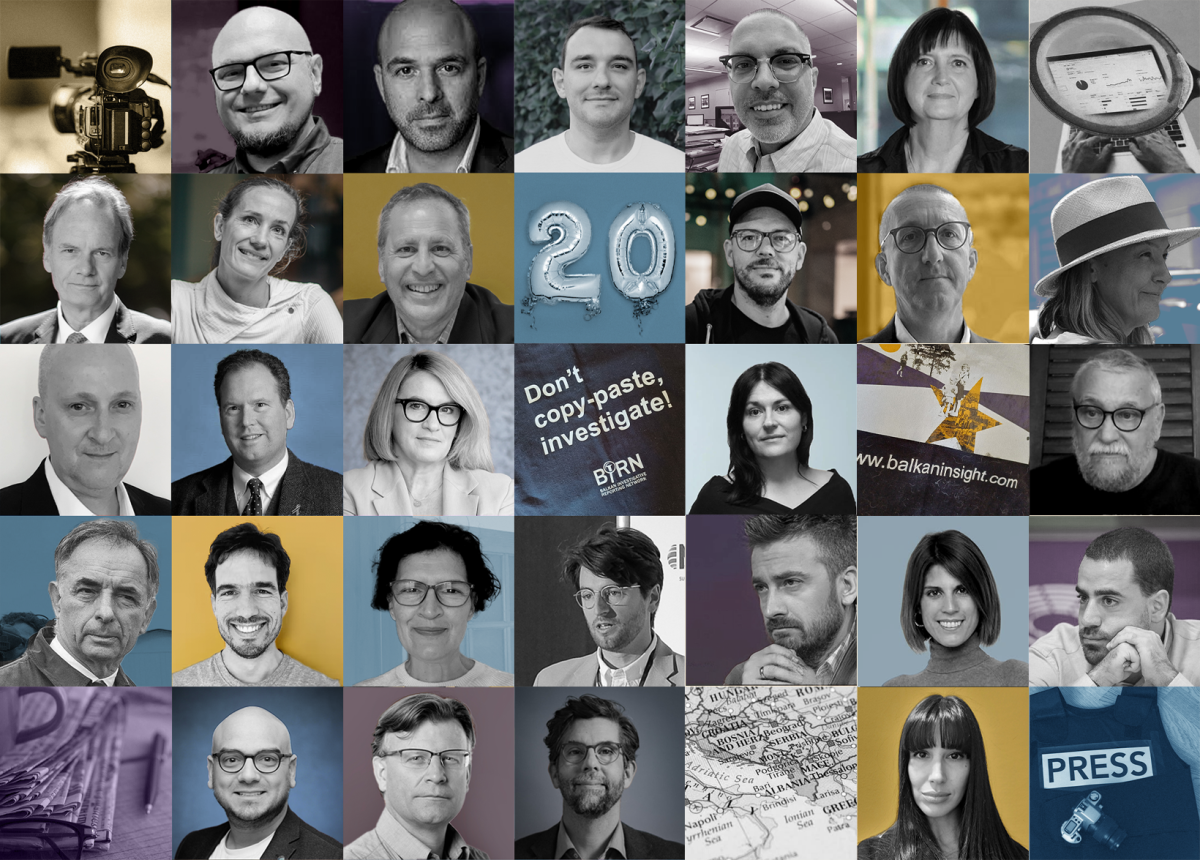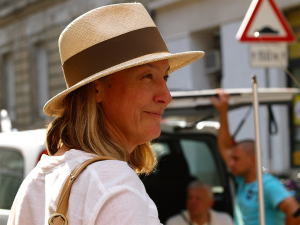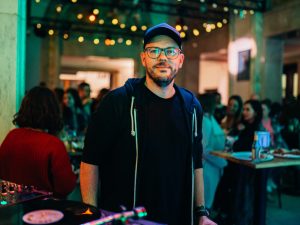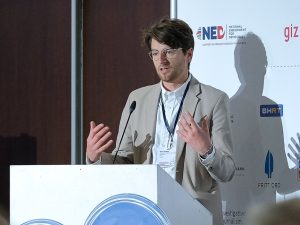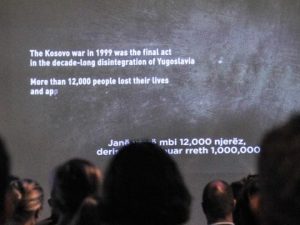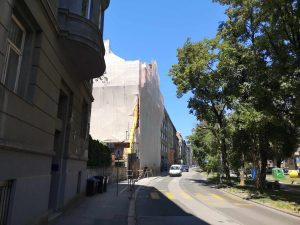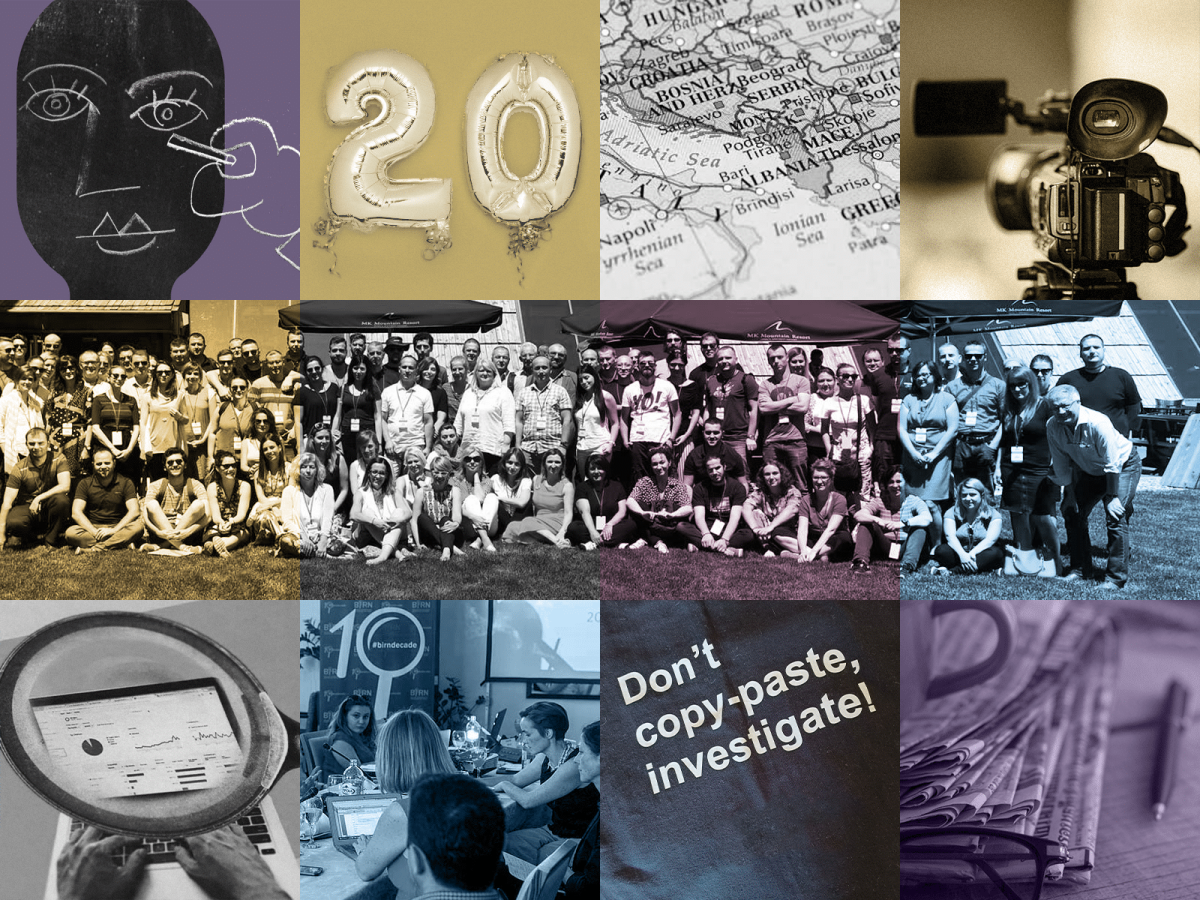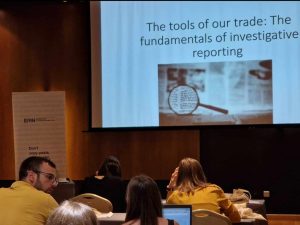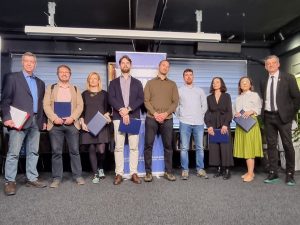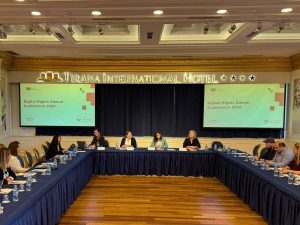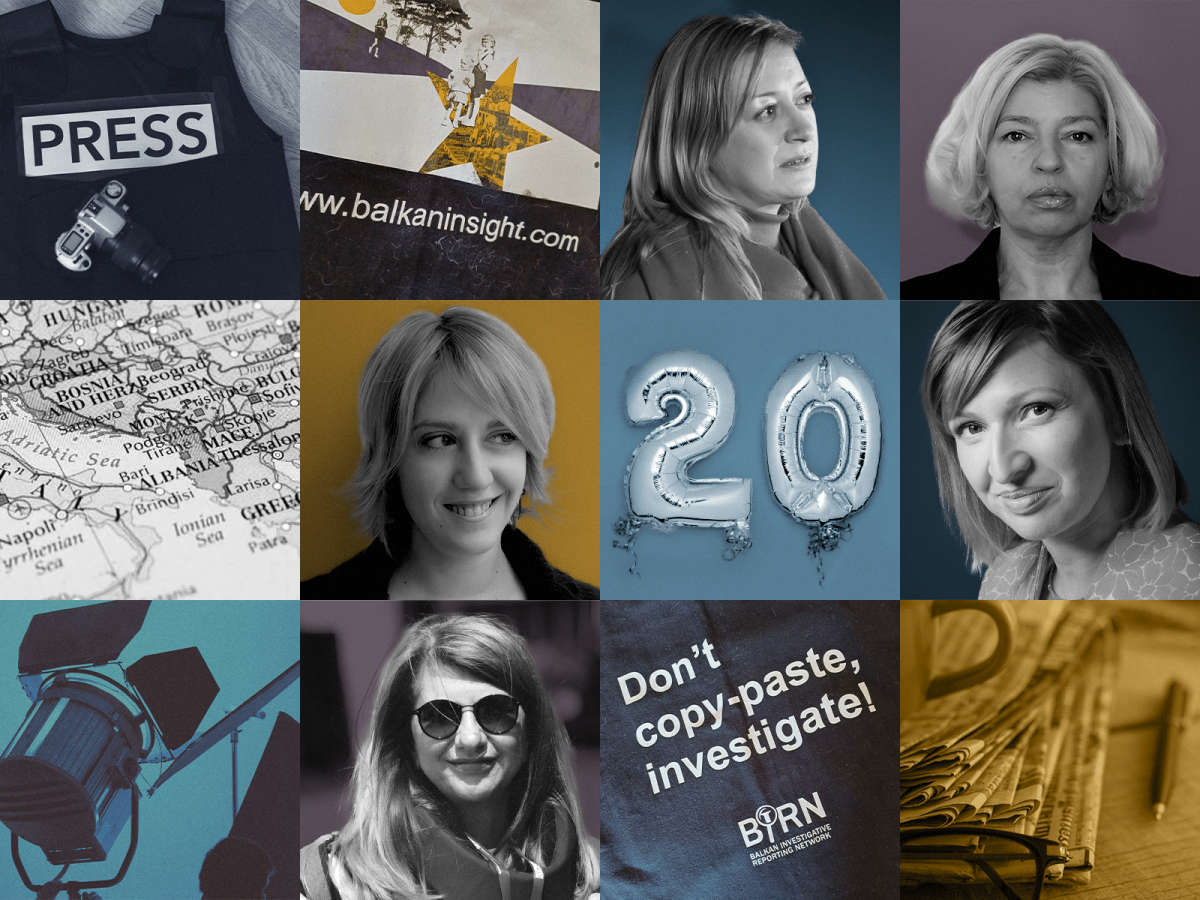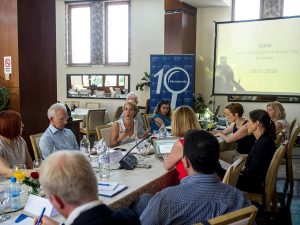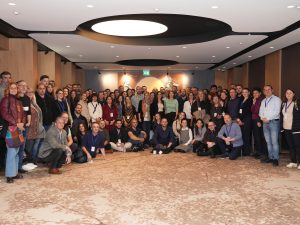It all started in 2005, when five women from countries recovering from brutal wars defied the odds to establish what would become a major independent media organisation – the Balkan Investigative Reporting Network – in the traditionally patriarchal region of the Western Balkans. They were Gordana Igric, Nerma Jelacic, Ana Petruseva, Dragana Solomon and Jeta Xharra.
Jeta has been Country Director of the BIRN office in Kosovo since then. She says the media landscape in Kosovo and the energy of the country back then were frustrating.
“We had just had the March [2004] riots and the media was seen as complicit, by fueling inter-ethnic violence. People were generally frustrated that Kosovo was not yet being allowed to become a [free] country, even though it was clear that from the rise of [Serbian leader Slobodan] Milosevic that is what the majority of people wanted.
“The 2004 March riots were a particular warning for me, that we urgently needed to provide unbiased, balanced, independent, watchdog and scrutinizing journalism that would broadcast to the masses – and not just in an online portal in English, where only the most sophisticated people who read English would be informed,” Jeta explains.
She chose to approach public TV in Kosovo, RTK, proposing a current affairs programme that was uncompromising and “hard-talk” in style, discussing the most taboo subjects. The programme, produced by BIRN, was named “Jeta ne Kosove” (Life in Kosovo).
“I collaborated with Faik Ispahiu, a brilliant theatre director in Kosovo, to produce this programme, for which I spent one year fundraising. When one out of the 20 donors I contacted said ‘yes’ to funding the programme, I pleaded with the director of the public TV for months to give me a TV time slot,” she recalls.
“He gave me a 23:30 time slot, which was so late, a type of grave slot, but I knew we’d address topics nobody else was brave enough to address like the secret services of the different political parties existing at the time, corruption, violence against women etc.,” Jeta says.
After a year, when viewership figures were measured, it was the second most-watched informative programme after the evening news.
“That public TV director who’d first spent so much time avoiding me and gave me such a late schedule called and said: ‘We have to do something about putting your programme on prime time because way too many people are watching it.’ So, we earned our right to a 20:30 TV slot and were the only BIRN product that was weekly on any television in the region, talking to a mainstream audience, which we tried hard to educate and emancipate, not just inform,” she recalls.

“We broadcast on public TV until May 2020, when we were kicked out because of pressure from an oligarch [Blerim Devolli] we were investigating who ordered the then RTK Director to kick us out. Today, that RTK Director, Ngadhnjim Kastrati, works for a television close to that oligarch. Clearly, he was rewarded for throwing us off the public TV, but on the other hand, our investigation saved 17 million euros of Kosovo public funds and won the best EU Investigative story in 2021,” she says.
“So, there is a price to pay for investigations but there is also a lot of impact. After we were kicked out of public TV, a very vibrant young TV channel, RTV Dukagjini, acquired our programmes and today, BIRN Kosovo, with a local partner organisation, Internews Kosovo, co-produces three programmes a week in primetime in this private TV station.”
Struggles over funding and security
For all this hard and dedicated work, the founders still confront obstacles in working as an independent regional media organisation.
“Our struggle is largely about securing funding for investigations, which are time-consuming and costly. After funding, training people to do the job professionally is also a challenge – we basically train everybody on the job, as our educational system in the Western Balkans does not prepare people to be critical thinkers
“Thirdly, clearly, the security of our staff is a challenge, as they are sometimes intimidated and harassed for the work they do. Protecting our whistleblowers is also a challenge because they have been known to lose their jobs and even risk being arrested for exposing corruption in our investigations. We do our best to support journalists and whistleblowers, and in BIRN Kosovo we do this with a very strong legal office that can assist these people in court.
“Ultimately, our work is worth it because we have some very brave and brilliant journalists working for us. For example, Kreshnik Gashi’s investigation, which started from a tip that a Serbian smuggler gave us from north Kosovo, resulted in the arrest of more than 10 Albanian and Serbian police and customs officers as well as smugglers who were doing contraband trade in the north of Kosovo.
“It gives me peace to know that there is a generation of journalists out there, beyond us, the ‘founding mothers’ of BIRN, that are carrying the flame of brave work in post-war Western Balkans. We are incredibly honoured that these journalists are a part of the BIRN team and I get such great energy working with them every day,” Jeta says.

Speaking of what BIRN represents to her personally, Jeta calls it “a community of fighters for accurate, unbiased and independent journalists who will not bow down to financial and political pressures.
“BIRN also tells the story of media professionals who do not need to be run by internationals to be brave and impartial enough to produce top-class journalism meeting international standards. We are largely run by a mantra that Goca Igric, the main founding mother of BIRN, installed in our brains: ‘Don’t write what you know, write what you can prove’,” she says.
Hope in the younger generation
When she thinks of BIRN today, she thinks of the younger generation of people in Kosovo. They include Albulena Sadiku, Deputy Director of BIRN Kosovo, who is the force behind fundraising for paying salaries of 70 people that work for BIRN in Kosovo, Kreshnik Gashi and Visar Prebreza, “both award-winning investigative journalists who have faced threats for the work they do but have never bowed down to this, and continue to produce work that makes the powerful uncomfortable.
“BIRN represents the watchdog that our countries need to lead them into modernity and closer to EU standards – so I would best call BIRN ‘an organised civil society’ that is fighting ‘organised crime’ in the Western Balkans. Finally, what BIRN represents most is credible information – if you read us, you are most likely to find the most truthful version of the story possible, and accurate information is worth a fortune these days, and it always has been,” Jeta adds.
But, what were her expectations in 2005, and has she met them?
“In terms of what the media is capable of doing, I think we have exceeded expectations because of the impact we have had in the society by ensuring public money is better spent, that culprits are often arrested, and the powerful are more fearful … because of our existence.
‘However, as Kosovo was the least developed part of former Yugoslavia with the least investment, I’m not happy with how slowly my country has developed and that we have not managed to speed up our country’s progress more than we have. I believe the media is very powerful and truly a ‘fourth pillar’, so I feel we need to take some responsibility for our Western Balkan societies, which are still so far away from EU membership in 2025,” Jeta explains.
In her opinion, the network’s totally unexpected growth was one of the most significant changes in the organisation in the first 20 years.
“We were a team of five aficionados that founded BIRN in 2005, never imagining that we would have a team of 300 people working for us throughout the region. The change is obvious. Most people thought we would fizzle out – that we would run out of money and would not have the energy to withhold our journalism that was expensive, fearless and independent. Not only did we not fizzle out and close down but we grew and are still growing. We were five individual journalists who knew what we wanted in 2005 – and today we are unquestionably an institution for credible journalism,” Jeta says.
In addition to all her work as Country Director, she still hosts the award-winning current affairs TV programme Life in Kosovo. Explaining how she manages everything, she explains: “I can host the programme because I work with such a capable team. De facto, Albulena Sadiku [Deputy Director of BIRN Kosovo and Head of Development] runs BIRN while I do the journalism. Because we have so many good journalists who work for us, I have been able to set up a completely new project, a museum of the resistance of the 1990s, called Reporting House. I invite you all to come and see it in central Pristina.”

Huge debt owed to Gordana Igric
Would Jeta have done anything differently in her professional path during the past 20 years?
“If I’d changed that path, probably a lot of things that have happened may not have happened, so this is a tricky ‘what-if’ question,” she says.
“All the good and the bad I did professionally have led to this incredibly vibrant organisation that we have today, which is alive and kicking, feared by all officials in Kosovo, and an address for corruption reporting. This was done with such amazing teamwork that it was simply not possible to be done by one person. I almost have a feeling that even if I’d done something differently, these 50 or so people who work now in BIRN would have made the organisation what it is, with or without me. Society needed BIRN Kosovo to do what it does, and that is why it exists, despite what I may or may not have done.”
But, she would have done one thing differently.
“What I would seriously have liked to have done differently, and maybe there is still time to correct that, is create a retirement fund for our founding mother of BIRN, Goca Igric, who retired early, after setting up BIRN, often sacrificing her own salary to pay journalists in the early days when we were not heavily funded. I feel we owe her a lot…. I want to make this better somehow.”
Speaking of the future, Jeta says: “Hopefully, [we are] even more relevant than today because we are heading into uncharted territories where a lot of what should be journalism is now ‘content production’, social media and AI influenced, short clipped, angled to a short attention span audience. In this kind of bombardment of information, we are facing a blunted audience that is finding it hard to differentiate fake news from truth, and credible from suspicious sourcing of information, so the industry is saturated with just information.
“That is why credibility, accuracy and fact-checking are more important than ever. We have the right, skilled people to tackle this challenge in this era, so I think we are going to be even more relevant in the future than in the past. Also, we are the only true cross-regional outlet in English that has people all over the Western Balkans. You can’t find a medium like Balkan Insight in the region, so it is not going anywhere soon!”
‘Tour guide’ in her spare time
At the end, Jeta discusses what she likes to do during her spare time.
“I build museums in my spare time. I am digging through archives. Recently, I went down the Trepca mine, almost 1 km underground, walking in the tunnels for hours with our museum curator, Gazmend Ejupi, in order to tell its story and produce this incredible installation with Trepca minerals, which marks the 100-year anniversary of when Trepca ore started to be explored in the industrial age.
“So, I am interested in preserving the collective memory of Kosovo in my spare time and working with artists, not just journalists and researchers in this field. This has been so refreshing, to occupy my brain with periods of history that are not ‘current affairs’ and look at this material with creative and talented artists who think in a completely different way from journalists.”
Jeta says this project her helped “stretch” her brain in different directions.
“That is why I am also thankful to BIRN – it is an organisation that allows you the freedom to develop such projects. It is now in the BIRN mandate to build museums; it is in the statute of our organisation. That’s why I believe we will become even more relevant in the future because so many people from different fields are interested in collaborating with us and contributing their archives to our museum.

“It’s become a community museum. Almost 11,000 people have visited Reporting House since it opened in June 2024, on the eve of the 25th anniversary of the NATO bombing. It is becoming part of the city, telling the story of how Kosovo came to be a country, and students, pupils, and lots of tourists are all visiting. So, I have become a museum guide in my free time. What fun!” she concludes.

